新课标Go for it 九年级unit4要点
新目标Go_for_it_九年级英语_课文参考翻译
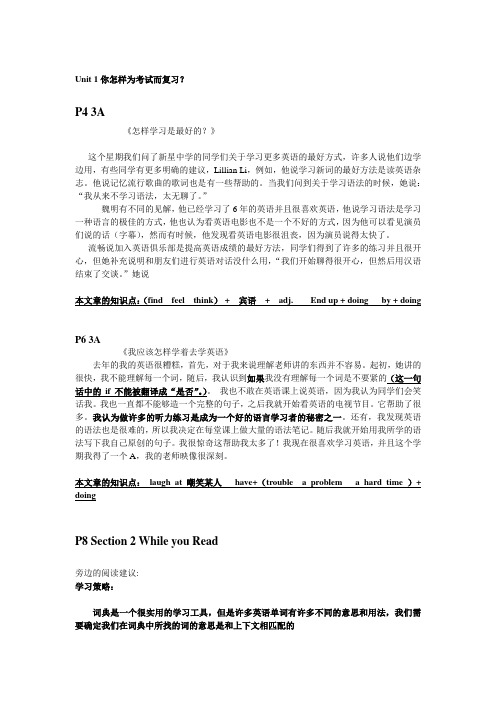
Unit 1你怎样为考试而复习?P4 3A《怎样学习是最好的?》这个星期我们问了新星中学的同学们关于学习更多英语的最好方式,许多人说他们边学边用,有些同学有更多明确的建议,Lillian Li,例如,他说学习新词的最好方法是读英语杂志。
他说记忆流行歌曲的歌词也是有一些帮助的。
当我们问到关于学习语法的时候,她说:“我从来不学习语法,太无聊了。
”魏明有不同的见解,他已经学习了6年的英语并且很喜欢英语,他说学习语法是学习一种语言的极佳的方式,他也认为看英语电影也不是一个不好的方式,因为他可以看见演员们说的话(字幕),然而有时候,他发现看英语电影很沮丧,因为演员说得太快了。
流畅说加入英语俱乐部是提高英语成绩的最好方法,同学们得到了许多的练习并且很开心,但她补充说明和朋友们进行英语对话没什么用,“我们开始聊得很开心,但然后用汉语结束了交谈。
”她说本文章的知识点:(find feel think)+ 宾语+ adj. End up + doing by + doingP6 3A《我应该怎样学着去学英语》去年的我的英语很糟糕,首先,对于我来说理解老师讲的东西并不容易。
起初,她讲的很快,我不能理解每一个词,随后,我认识到如果我没有理解每一个词是不要紧的(这一句话中的if不能被翻译成“是否”。
)。
我也不敢在英语课上说英语,因为我认为同学们会笑话我。
我也一直都不能够造一个完整的句子,之后我就开始看英语的电视节目。
它帮助了很多。
我认为做许多的听力练习是成为一个好的语言学习者的秘密之一。
还有,我发现英语的语法也是很难的,所以我决定在每堂课上做大量的语法笔记。
随后我就开始用我所学的语法写下我自己原创的句子。
我很惊奇这帮助我太多了!我现在很喜欢学习英语,并且这个学期我得了一个A,我的老师映像很深刻。
本文章的知识点:laugh at 嘲笑某人have+(trouble a problem a hard time )+ doingP8 Section 2 While you Read旁边的阅读建议:学习策略:词典是一个很实用的学习工具,但是许多英语单词有许多不同的意思和用法,我们需要确定我们在词典中所找的词的意思是和上下文相匹配的《我们怎样解决我们的问题》富贵或贫穷,年轻或年老,我们都有所困扰的问题。
Go for it 九年级Unit 4

____4.If I were you, I’d take a small present.
____5.If you don’t know anyone, you can talk to Tom. ____6.But if you’re still nervous, you don’ a
2b
2b:
Answers:
2a
1; 2; 4; 5
在条件状语从句中,主句用过去将来时,从句要 用一般过去时来表过去将来时。 Example: I’d wear a shirt and tie if I were you . What would you do if you had a million dollars?
比尔盖茨1.jpg 比尔盖茨3.jpg
假如我是比尔盖茨.doc
What would you do if you have so much money? (a lot of money/a million dollars?)
They are giving the donation to the disaster area people. 捐款给灾区人民
Listen and number
C:\Documents and Settings\All Users\桌面\100e英语听说训练 平台.lnk
1b
Answers: 2; 1; 3
A: Look. This old man had a million dollars, and he gave it to charity. B: Wow! What would you do if you had a million dollars? A: I’d give it to medical research.
人教版新目标Go for it(九年级全一册)Unit3-Unit4文本及翻译

Unit3 Section A 对话(1)Role-play the conversation.分角色表演对话。
This is Fun Times Park, the biggest amusement park in our city!这是欢乐时光公园,是我们城市中最大的娱乐公园。
I'm excited to try the rides!我很激动可以尝试这段旅程。
What should we start with?我们应该从哪里开始呢?There's Space World, Water World, Animal World...这里有太空世界,水世界,动物世界……Before we decide, could you first tell me where the restrooms are?在我们做决定之前,你能告诉我洗手间在哪吗?Pardon? Restroom? You want to rest?什么?休息室?你想要休息吗?But we haven't even started yet!但是我们还没有开始呢!Oh no, I don't mean that.哦,不!我不是那个意思。
I mean... you know, a washroom or bathroom.我的意思是…你知道,洗手间或者厕所。
Hmm... so you mean... the toilet?嗯…所以你想上厕所?Yes! Sorry, maybe people in China don't often use the word "restroom" when they speak English.是的!抱歉,或许当中国人说英语的时候很少用"restroom"这个单词。
That's right. In China, we normally say "toilet" or "washroom" in English.是的。
人教版新目标英语九年级Go for it 1-15单元知识重点汇总【整理打印版】

Unit 1 How do you study for a test? 你怎样为考试做准备?I.重点词汇Key Wordstest — exam words — vocabularyexcited — exciting amazing — surprisingsometimes — sometime — some times — some timefor example — such as — like begin with — to begin withmaybe — perhaps — probably affect — influenceproblem — questionII.重点词组Key Phrasesask…for…speaking skillsask…about…not…at allget excited about end upmake mistakes first of allto begin with later onbe afraid of laugh atmake sentences take noteswrite down make suredeal with look upmake up worry aboutbe angry with go byeach other solve a problemregard…as…complain aboutchange…into…try one’s bestwith the help of compare…to…think about break offIII.重点句子Key Sentences1. I learn by studying with a group.2. It’s too hard to understand the voices.3. He finds watching movies frustrating because the people speak too quickly.4. We get excited about something and then end up speaking in Chinese.5. Why don’t you join an English club to practice English.6. Last year my English class was difficult for me.7. It was easy for me to understand the teacher.8. Now I’m enjoying learning English.9. Perhaps we have seen young children playing together.IV.话题语法Topic & Grammar1. 谈论学习方法2. by+v-ing结构做状语Unit 2 I used to be afraid of the dark. 我过去害怕黑暗。
Unit 4 (单元复习课件)-九年级英语全一册(人教新目标Go for it!)
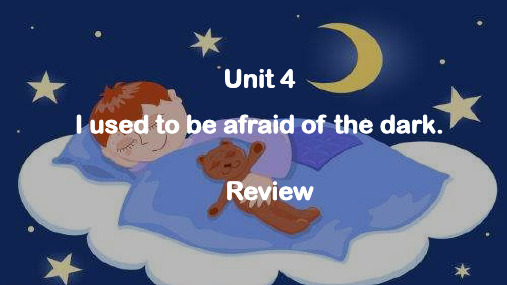
审题 1.审主题: 我的变化 2. 审体裁: 说明文 3.审人称: 第一人称 4.审时态: 一般过去时,一般现在时 5. 审要点: 过去与现在的对比
Writing
Follow the prompts to write an article to talk about your change.
A.Even
B.Even though C.If
D.Unless
(A)4. You can made a _____ instead of him.He doesn't have to go
there_____ person.
A.decision;in B.decide;in C.decision;by D.decide;by
05 Writing
Writing
Write about how you have changed. What did you use to be like? Which change is the most important one and why?
Try to write two paragraphs. Paragraph 1: General introduction about the changes in your life Paragraph 2: The most important
Language points
Point 7.Now she’s not shy anymore and loves singing in front of crowds. not ... anymore = no more,不再 e.g:He doesn't come late anymore.
新课标九年级英语unit4英语知识点

新课标九年级英语unit4英语知识点Unit 4: English Language SkillsIntroduction:In the ninth grade, students are introduced to a variety of English language skills that are essential for effective communication. This unit focuses on important aspects such as grammar, vocabulary, comprehension, and writing skills. Developing a strong foundation in these areas will not only enhance students' language proficiency but also empower them to express their thoughts and ideas confidently.Grammar:Grammar forms the backbone of any language, and English is no exception. Understanding the rules and structures of English grammar is crucial for forming correct sentences and communicating effectively. In Unit 4, students explore different tenses, such as the simple present, simple past, and future tenses. They learn how to use these tenses appropriately in sentences, allowing for accurate communication of actions and events in the past, present, and future.Vocabulary:Expanding one's vocabulary is vital for improving language skills. In this unit, students engage in various vocabulary-building exercises that encompass both everyday and academic words. They learn synonyms, antonyms, and phrases that can be used to express particular ideas or feelings. Additionally, students are encouraged to incorporate new words into their writing and speaking, promoting a deeper understanding and a wider range of expression.Reading Comprehension:Comprehension is the ability to understand and interpret written texts accurately. Unit 4 focuses on developing reading comprehension skills through a range of texts, including fiction, non-fiction, and informative articles. Students learn how to identify main ideas, infer meaning from context, and make connections between different parts of a text. Building these skills not only helps students become more critical readers but also enhances their overall language proficiency.Writing:Effective writing skills are crucial for expressing ideas and opinions clearly. In this unit, students are introduced to various types of writing, such as narratives, descriptive essays, and persuasive pieces. They learn how to structure their writing, organize their thoughts, and develop coherent paragraphs. Additionally, students explore different writingtechniques, such as using vivid imagery and employing persuasive language, to make their writing more engaging and persuasive.Listening and Speaking:Listening and speaking skills play a significant role in effective communication. Unit 4 encompasses activities that focus on enhancing students' listening and speaking abilities. Students engage in listening exercises to improve comprehension, develop note-taking skills, and practice following instructions accurately. Furthermore, they participate in discussions, debates, and presentations to refine their speaking skills and express their thoughts confidently in English.Conclusion:Unit 4 of the ninth-grade English curriculum provides students with a comprehensive understanding of essential language skills. By mastering grammar, expanding vocabulary, improving reading comprehension, developing writing skills, and enhancing listening and speaking abilities, students will be equipped to express themselves fluently and accurately in English. These fundamental skills will not only boost their performance in future English courses but also prepare them for various academic and professional endeavors where effective communication is paramount.。
九年级英语_unit_4虚拟语气的用法_人教新目标(Go_for_it)

虚拟语气及用法1. 语气就是我们常说的说话人说话的口气。
在汉语中,语气是由说话人说话的语调、情节等等表现出来的,动词没有任何变化。
而在英语中,除了语调之外,最主要的是动词发生变化而表示不同的语气。
在英语中语气分为三类:陈述语气、祈使语气、虚拟语气。
2. 虚拟语气:如果我们所说的不是事实,也不是要求、命令、劝告等,而只是一种假设、愿望、建议或是一种实现不了的空想就用虚拟语气。
3. 虚拟语气常用在条件句中,及其他一些从句中。
注意:条件句分两种,真实条件句和虚拟条件句。
只有在虚拟(非真实)条件句中,才用虚拟语气,而在真实条件句中,要用陈述语气。
请比较:(1)If it is sunny tomorrow , we’ll go shopping.如果明天天气好,我们将会去购物。
在这句话中,明天天气好是完全有可能实现的,并非虚拟、幻想,因此是真实条件句。
在本句中,适用“主句将来时态从句现在时态。
”(2)(如果我是你的话,我会赶上车。
)在这句话中,条件句,“如果我是你”,但事实上,我不可能成为你,这只是假设的情况,没有实现的可能。
当条件实现的可能性很小,甚至可以说没有时,就需要用虚拟语气来表示,动词发生了变化。
4. 在虚拟语气中,句子动词的时态比真实条件句中的时态后退一步即:现在时→过去时(该用现在时时,用过去时)过去时→过去完成时(该用过去时时,用过去完成时)将来时→过去将来时(该用将来时时,用过去将来时)过去将来时→过去将来完成时(该用过去将来时时,用过去将来完成时)在这一单元中,我们只要求初步接触虚拟语气的用法及结构,学习表示与现在事实相反的情况下如何体现虚拟语气。
5. “表示与现在事实相反的情况”的虚拟语气请看例句:If I were you, I would climb the hill.如果我是你的话,我就会爬山。
(注:在这个句子中,即“If I were you 中,一定用were ,而不能用was”)(这句话中,是与现在的事实相反,“现在如果我是你的话。
九年级英语上册(人教新目标GoForIt!)Unit4第4课时(SectionB1a1e)教学设计

4.各小组向全班展示讨论成果,其他学生认真聆听,给予评价和反馈。
(四)课堂练习(500字)
1.教师发放练习册,要求学生完成与日常活动和频率副词相关的练习题。
2.教师选取部分题目进行讲解,强调解题技巧和注意事项。
3.学生互相批改练习,讨论并解决存在的问题。
2.教师通过PPT展示,讲解本节课的核心词汇和短语,如:clean, sweep, mop, vacuum, wash, dry, take out the trash, make the bed, cook, read, practice等,并让学生跟读、模仿。
3.教师创设情境,展示一段关于家庭成员日常活动的视频,引导学生关注视频中人物的动作和频率副词的使用。
三、教学重难点和教学设想
(一)教学重难点
1.重点:本章节的重点在于培养学生运用一般现在时、一般过去时和一般将来时描述家庭成员的日常活动,以及运用频率副词表达习惯性行为。
难点:时态的正确运用和频率副词的准确使用,对于部分学生来说具有一定的挑战性。
2.重点:核心词汇及短语的掌握,如:clean, sweep, mop, vacuum, wash, dry, take out the trash, make the bed, cook, read, practice等。
4.自主学习:
a.收集有关日常活动和频率副词的英语例句,进行学习和积累。
b.自主查找并学习其他与家庭生活相关的英语表达,拓宽词汇量和知识面。
5.家长参与:
a.请家长协助学生完成口头作业,鼓励学生大胆开口说英语。
b.家长与学生一起观察家庭成员的日常活动,用英语进行交流,提高学生的实际运用能力。
Unit4 (Section B 3a-self)九年级英语全一册(人教新目标Go For It!)
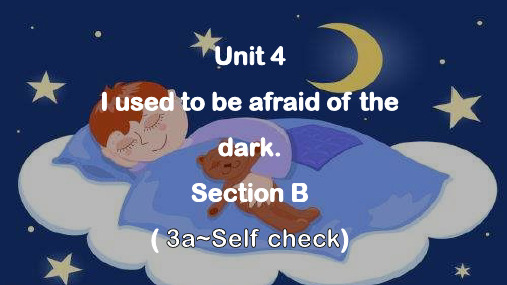
And move forward step by step 就一步一步往前走
Life could be turned around at any time 人生随时都又可能翻盘
Let’s tቤተ መጻሕፍቲ ባይዱlk
Use “used to” and “but now” to talk about your change.
Now he has changed a lot. He becomes more_o_u_tg_o_i_n_g_What's more, he is very _h_u_m_o_r_o_u_s (幽默). He often makes people laugh and happy.
Let’s write 3a Write notes about how you have changed in your hobbies.
I used to read comic books .
But now, I read novels.
Let’s talk
Use “used to” and “but now” to talk about your change.
I used to play games .
But now, I play basketball.
Unit 4
I used to be afraid of the
dark.
Section B
(
)
01 Leadii-给in 02 Writiini给g 03 Practii给ice 04 Self-cii给heck
05 Exercii给ise 06 Sumimi给 ary 07 Homiie给work
九年级英语全一册(人教新目标GoForIt!)Unit4第1课时(SectionA1a2d)教学设计

3.教师通过PPT展示一般现在时的结构,并结合实例进行讲解,如:I like playing baseball because it's exciting.
4.学生跟读并模仿,巩固新学的语法知识。
5.教师拓展讲解与兴趣爱好相关的词汇,如:interesting, relaxing, exciting等,并让学生进行实际运用。
4.情感融入,价值引导:在教学过程中,关注学生的情感需求,引导他们尊重他人、欣赏他人,培养正确的人生观和价值观。
5.巩固拓展,提升能力:通过课后作业和拓展活动,巩固所学知识,提高学生的语言运用能力。
具体教学设想如下:
1.导入:展示与兴趣爱好相关的图片,引导学生用英语进行描述,激发学生的学习兴趣。
2.新课呈现:通过听力练习,让学生感知一般现在时描述兴趣爱好的用法,并学习相关词汇。
3.阅读拓展:阅读一篇关于兴趣爱好的英文文章,了解不同文化背景下人们对兴趣爱好的看法和喜好。要求做好阅读笔记,并在课堂上与同学分享。
4.小组活动:与同学组成小组,共同探讨以下话题:“How can hobbies help us in our daily lives?”各小组成员积
难点:如何让学生在实际语境中灵活运用一般现在时,进行流畅的交流。
2.重点:提高学生的听力理解能力,能够抓住关键信息,理解他人观点。
难点:引导学生从听力材料中提炼关键信息,并进行有效的信息整合和反馈。
3.重点:培养学生的口语表达能力,使其能够就兴趣爱好进行简单对话。
难点:如何激发学生的表达欲望,使其在真实的语境中敢于开口、自信表达。
(三)学生小组讨论,500字
新目标Go for it版 九年级 Unit 4 I used to be afraid of the dark Section B 1a-1e课件(共9张PPT)

1d Listen again. What do the girl and the boy say about things in the past and now? Fill in the chart. In the past Now
__ painting pictures
I used to like ...
__ music class
1b What other things did you use to like to do when you were a child? what else I used to like _______________.
watching Cartoons
wearing whatever we like to school
ants and other insects
going fishing
1a What did you use to do when you were a child?
__ P.E. class
__ ants and other insects
I don’t worry about tests ____.
We used wear ________________ whatever we like to school. study all the We _____ time. I ____ love P.E. class.
Boy
1e Compare yourself with your partner. A: I used to be nervous about tests all the time. What about you? B: Yes, me too. And I used to ...
九年级英语上册(人教新目标GoForIt!)Unit4第2课时(SectionA3a3c)教学设计
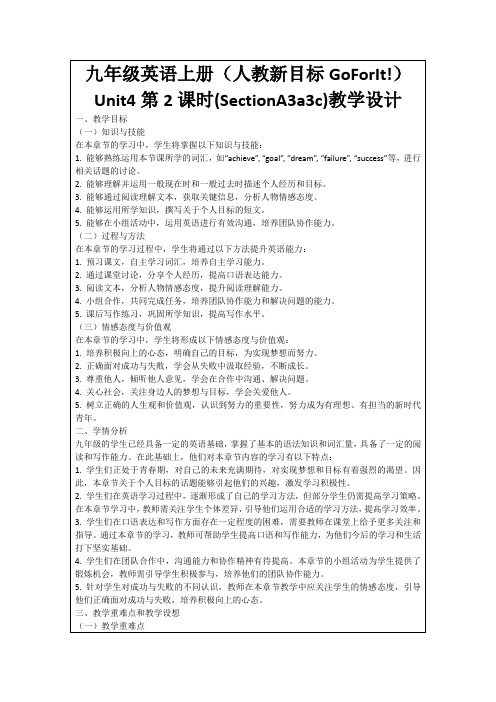
为了巩固本节课的学习成果,激发学生对个人目标的思考,特布置以下作业:
1.写作练习:请结合本节课所学内容,以"My Goals and Dreams"为主题,写一篇短文。要求运用一般现在时和一般过去时描述你的个人目标、经历及对未来的规划。文章不少于80词,要求语言通顺,表达清晰。
2.课后阅读:阅读一篇关于成功人士的故事,分析他们的成功因素,并结合自己的目标,思考可以借鉴的经验。将阅读心得整理成文字,不少于100词。
3.小组讨论:与你的小组成员共同讨论以下问题:
a. What do you think are the keys to achieving our goals?
b. How can we overcome failures and setbacks in our pursuit of success?
2.提高阅读理解能力,采用以下方法:
a.引导学生预习课文,培养自主学习能力。
b.设计问题,让学生在阅读过程中寻找答案,提高阅读目的性。
c.组织课堂讨论,让学生分享阅读心得,提高阅读理解深度。
3.培养团队协作能力和沟通能力,采取以下措施:
a.设计有趣的小组活动,激发学生的参与热情。
b.引导学生明确各自角色和任务,确保团队合作的有效性。
5.针对学生对成功与失败的不同认识,教师在本章节教学中应关注学生的情感态度,引导他们正确面对成功与失败,培养积极向上的心态。
三、教学重难点和教学设想
(一)教学重难点
1.重点:本章节的重点在于让学生掌握描述个人目标、经历和情感态度的词汇和句型,如“achieve”, “goal”, “dream”, “failure”, “ss”等,并能运用一般现在时和一般过去时进行表达。
新目标(Go for it)版九年级全-4

I want to be a member of your class .
What rules do you have in your class ?
Dear Happy , Welcome to be a member of our class . In our class , we have to …We are allowed to …We are not allowed to …..We should obey the rules .We will work well with Miss Zhang .We know a good class needs strict rules.
6. 那个年龄的他们不够稳重。 They are not serious enough at that age. 7.你家有什么规定吗? -What rules do you have at home ? 噢,我在周一至周五不能外出。 -Well , I’m not allowed to go out on school nights.
4. Wear school uniforms every day. 5. We can’t listen to music in the classroom. 6. Keep the classroom clean every day. 7. We can’t study in groups during the evening classes. 8. Be friendly to both teachers and classmates. 9. W e can play sports after school.
Teachers believe that if we wore our own clothes , we would concentrate more on our clothes than our studies .
go for it 九年级九上Unit4 重点短语、句子
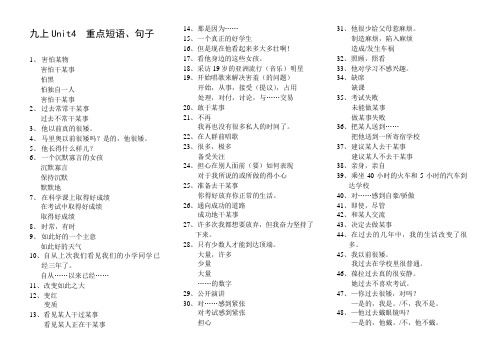
九上Unit4 重点短语、句子1、害怕某物害怕干某事怕黑怕独自一人害怕干某事2、过去常常干某事过去不常干某事3、他以前真的很矮。
4、马里奥以前很矮吗?是的,他很矮。
5、他长得什么样儿?6、一个沉默寡言的女孩沉默寡言保持沉默默默地7、在科学课上取得好成绩在考试中取得好成绩取得好成绩8、时常,有时9、如此好的一个主意如此好的天气10、自从上次我们看见我们的小学同学已经三年了。
自从……以来已经……11、改变如此之大12、变红变质13、看见某人干过某事看见某人正在干某事14、那是因为……15、一个真正的好学生16、但是现在他看起来多大多壮啊!17、看他身边的这些女孩。
18、采访19岁的亚洲流行(音乐)明星19、开始唱歌来解决害羞(的问题)开始,从事,接受(提议),占用处理,对付,讨论,与……交易20、敢于某事21、不再我再也没有很多私人的时间了。
22、在人群前唱歌23、很多,极多备受关注24、担心在别人面前(要)如何表现对于我所说的或所做的得小心25、准备去干某事你得好放弃你正常的生活。
26、通向成功的道路成功地干某事27、许多次我都想要放弃,但我奋力坚持了下来。
28、只有少数人才能到达顶端。
大量,许多少量大量……的数字29、公开演讲30、对……感到紧张对考试感到紧张担心31、他很少给父母惹麻烦。
制造麻烦,陷入麻烦造成/发生车祸32、照顾,照看33、他对学习不感兴趣。
34、缺席缺课35、考试失败未能做某事做某事失败36、把某人送到……把他送到一所寄宿学校37、建议某人去干某事建议某人不去干某事38、亲身,亲自39、乘坐40小时的火车和5小时的汽车到达学校40、对……感到自豪/骄傲41、即使,尽管42、和某人交流43、决定去做某事44、在过去的几年中,我的生活改变了很多。
45、我以前很矮。
我过去在学校里很普通。
46、葆拉过去真的很安静。
她过去不喜欢考试。
47、—你过去很矮,对吗?—是的,我是。
/不,我不是。
goforit九年级unit4全单元教案

Englishຫໍສະໝຸດ 课型fresh年级
9
课题
Unit 4 What would you do? 2/6
教学
媒体
A tape recorder , CAI
教
学
目
标
知识
技能
1. Key Vocabulary
tie
2. Target Language
What would you do if you won a million dollars?
I'd give it to charities.
If I were you, I'd wear a shirt and tie.
If I were you. I'd take an umbrella.
过程
方法
According to designing some tasks, train students' listening skill and communicative competence.
Read the sentences.
Students listen and check the things.
Read the sentences.
Look back at the list of checkedsentences.
为听力做铺垫。
检测学生的听力水平。
同2a
进行口语训练,把知识转化为自己生活中的用语。并对
After all the students have a chance to play both parts, stop the activity. Ask different students to perform their conversations.
新目标(Go for it)版九年级英语 Unit 4 I used to be afraid of

Unit 4 I used to be afraid of the dark.第一课时(Section A 1a-2d)use d to 意为“过去常常”,后接动词原形,表示过去的动作或状态。
疑问句由Did …use to…?或Use …to…?构成。
Did he use to play soccer? = Used he to play soccer?否定句由didn`t use to…?或used not to…(usedn`t to…)构成。
I didn`t use to be very quiet. = I used not to be quit.拓展:be used to doing sth. “习惯于做某事”,可用于各种时态;He is used to going to sleep early.他习惯于早睡be used to do sth. “被用于做某事”,是被动语态,不定式表目的。
用于多种时态。
Wood is used to make houses.木头被用来造房子。
be afraid of 相当于be terrified of 都有“害怕”的意思。
前者语气较轻。
be afraid of sb./sth.害怕某人某物”Are you afraid of snakes?be afraid of doing sth.“害怕做某事”I`m afraid of going out alone at night.be afraid to do sth. “害怕去做某事”I`m afraid to travel by plane.be afraid +that 从句,句中afraid意为“恐怕,担心”see sb do sth 看到某人做某事,指看的全过程;I saw you put the key in your pocket. 我见你把钥匙放进了口袋里。
see sb doing sth 看到某人正在做某事,指看的瞬间动作。
人教go for it 九年级全一册Unit 4 section B短语讲解

翻译:
Jim在考试中取得了好成绩。
提示: n.考试 exam / examination
Jim did well in the examination.
7
寻找
look for
三个“找” look for
find
强调“寻找”的过程 强调“寻找”的结果
find out
指经过理解;分析;思考;询问等方法, “找到或查明,弄清楚”
提示: 当…时 When引导的时间状语从句
Jim looks after his younger sister when his parents are not at home.
10 感到孤独
feel lonely
But he missed his parents so much and he often felt lonely and unhappy.
两个“建议”
advise v.建议
advice n.建议
翻译:
他的话对我的影响很大
提示: 他的话 What he said
What he said has a great influence on me.
5
学习努力
word hard
6
在…方面做得好
do well in
He works very hard and does well in school.
Sometimes he was absent from classes and failed his examination.
翻译:
如果你努力学习,你就会通过期末考试的。
提示:
如果 期末考试
if引导的条件状语从句 final exam
- 1、下载文档前请自行甄别文档内容的完整性,平台不提供额外的编辑、内容补充、找答案等附加服务。
- 2、"仅部分预览"的文档,不可在线预览部分如存在完整性等问题,可反馈申请退款(可完整预览的文档不适用该条件!)。
- 3、如文档侵犯您的权益,请联系客服反馈,我们会尽快为您处理(人工客服工作时间:9:00-18:30)。
32. hurry to do 匆忙…
I hurried to call the police.
33. more than 超过 34. offer sb. sth. (= offer sth to sb) 给某人提供某物 35 宾语从句:宾语从句在复合句中作主句的宾语。
由连接词+ 主语+ 谓语构成。常由下面的一些词引导:
3)由连接代词、连接副词(疑问词) 引导 表示特殊 疑问意义 Do you know what he wants to buy? 你知道他想要买什么吗? 从句时态要与主句一致当主句是一般现在时,从句根据情况使用任何
时态。 He says (that ) he is at home. 他说他在家里。
18. introduce sb. to sb. 把某人介绍给某人 I introduced Lily to Anna. 我把莉莉o do 邀请某人做某事 如: Lily invited me to go to her home for supper. 20. have breakfast/lunch/supper 吃早/午/晚餐 21. plenty of 修饰不可数名词,也可以修饰可数名词 They have plenty of food/ apples. 22. give sth. to sb.= give sb. sth. 给某人某物 give me an apple 23. get along with sb. 与…相处 如: Do you get along well with your friends? 24. would rather do sth. than do sth. 愿做某事而不愿做某事 如:
等词前面有数词时不能加s ,反之,则要加s 并 与of 连用, 表示数量很多 -- hundreds of …
7. what if + 从句
如果…怎么办,要是…又怎么样 要是她不来怎么办?
What if she doesn’t come?
8. add sth. to sth. 添加…到… I added some sugar to water. 9. 系动词与形容词连用 get nervous 变得紧张
13. energetic adj. 活力的 She is a energetic girl. energy n. 活力 She has lots of energies. 14. ask sb. to do 叫…做某事 ask sb. not to do sth.叫…不要做某事 tell sb. to do 告诉…做某事 tell sb. not to do sth. 告诉…不要做某事 15. start doing = start to do. 开始做某事 He started speaking/ to speak. 16. borrow sth. from sb. 从某人那里借来某物 I borrowed a book from Lily. 17. wait for sb.等某人 I am waiting for him. 我正在等他。
feel shy 觉得害羞 look friendly 看起来友好
10. too +形/副+to do sth. 太…而不能
I’m too tired to stand. 我太累了而不能站。
11. help sb with sth… /help sb. do sth. 12. in public 在公共场所
九年级第四单元知识点
1.虚拟语气(略) 2. pretend to do sth. 假装做某事 I pretended to sleep just now. pretend +从句 假装… I pretended that I fell asleep. 3. be late for 迟到 如: I am late for work/ school/ class/ party. 4. a few 与 a little ,few 与 little 的区别 5. still 仍然,还 用在be动词之后,行为动词之前 6. hundred, thousand , million, billion (十亿)
1)由that 引导 表示陈述意义 that 可省略
He says (that) he is at home. 他说他在家里。
2)由if , whether 引导 表示 一般疑问意义(带有是否、已
否、对否等) I don’t know if / whether Wei Hua likes fish. 我不知道韦华是否喜欢鱼。
25. whole 整个 26. in fact 事实上 27. let sb. down 让某人失望 如: Don’t let your mother down. 28. come up with sth. 提出 想出 catch up with sb. 追上 赶上 29. have experience doing 在做某事有经验 30. come out 出版,出来 The magazine comes out once a week. 31. by accident 偶然地,无意之中 Last week I cut my finger by accident.
